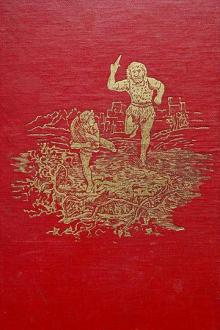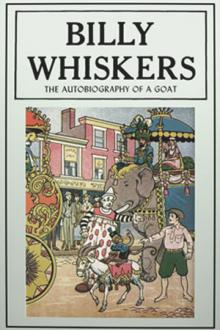The Red Fairy Book by Andrew Lang (interesting novels to read .txt) 📕

Read free book «The Red Fairy Book by Andrew Lang (interesting novels to read .txt) 📕» - read online or download for free at americanlibrarybooks.com
- Author: Andrew Lang
- Performer: -
Read book online «The Red Fairy Book by Andrew Lang (interesting novels to read .txt) 📕». Author - Andrew Lang
own snares. You leave it to me.’
`Leave it to the Town Counsellor,’ said the citizens one to another.
And the stranger was brought before them.
`Before night,’ said he, `I shall have despatched all the rats in
Hamel if you will but pay me a gros a head.’
`A gros a head!’ cried the citizens, `but that will come to millions
of florins!’
The Town Counsellor simply shrugged his shoulders and said to
the stranger:
`A bargain! To work; the rats will be paid one gros a head as
you ask.’
The bagpiper announced that he would operate that very evening
when the moon rose. He added that the inhabitants should at that
hour leave the streets free, and content themselves with looking out
of their windows at what was passing, and that it would be a pleasant
spectacle. When the people of Hamel heard of the bargain, they
too exclaimed: `A gros a head! but this will cost us a deal of
money!’
`Leave it to the Town Counsellor,’ said the town council with a
malicious air. And the good people of Hamel repeated with their
counsellors, `Leave it to the Town Counsellor.’
Towards nine at night the bagpiper re-appeared on the market
place. He turned, as at first, his back to the church, and the moment
the moon rose on the horizon, `Trarira, trari!’ the bagpipes resounded.
It was first a slow, caressing sound, then more and more lively
and urgent, and so sonorous and piercing that it penetrated as far
as the farthest alleys and retreats of the town.
Soon from the bottom of the cellars, the top of the garrets, from
under all the furniture, from all the nooks and corners of the houses,
out come the rats, search for the door, fling themselves into the
street, and trip, trip, trip, begin to run in file towards the front of
the town hall, so squeezed together that they covered the pavement
like the waves of flooded torrent.
When the square was quite full the bagpiper faced about, and,
still playing briskly, turned towards the river that runs at the foot
of the walls of Hamel.
Arrived there he turned round; the rats were following.
`Hop! hop!’ he cried, pointing with his finger to the middle of
the stream, where the water whirled and was drawn down as if
through a funnel. And hop! hop! without hesitating, the rats
took the leap, swam straight to the funnel, plunged in head foremost
and disappeared.
The plunging continued thus without ceasing till midnight.
At last, dragging himself with difficulty, came a big rat, white
with age, and stopped on the bank.
It was the king of the band.
`Are they all there, friend Blanchet?’ asked the bagpiper.
`They are all there,’ replied friend Blanchet.
`And how many were they?’
`Nine hundred and ninety thousand, nine hundred and ninety-nine.’
`Well reckoned?’
`Well reckoned.’
`Then go and join them, old sire, and au revoir.’
Then the old white rat sprang in his turn into the river, swam
to the whirlpool and disappeared.
When the bagpiper had thus concluded his business he went to
bed at his inn. And for the first time during three months the
people of Hamel slept quietly through the night.
The next morning, at nine o’clock, the bagpiper repaired to the
town hall, where the town council awaited him.
`All your rats took a jump into the river yesterday,’ said he to
the counsellors, `and I guarantee that not one of them comes back.
They were nine hundred and ninety thousand, nine hundred and
ninety-nine, at one gros a head. Reckon!’
`Let us reckon the heads first. One gros a head is one head the
gros. Where are the heads?’
The ratcatcher did not expect this treacherous stroke. He
paled with anger and his eyes flashed fire.
`The heads!’ cried he, `if you care about them, go and find
them in the river.’
`So,’ replied the Town Counsellor, `you refuse to hold to the terms
of your agreement? We ourselves could refuse you all payment.
But you have been of use to us, and we will not let you go without
a recompense,’ and he offered him fifty crowns.
`Keep your recompense for yourself,’ replied the ratcatcher
proudly. `If you do not pay me I will be paid by your heirs.’
Thereupon he pulled his hat down over his eyes, went hastily
out of the hall, and left the town without speaking to a soul.
When the Hamel people heard how the affair had ended they
rubbed their hands, and with no more scruple than their Town
Counsellor, they laughed over the ratcatcher, who, they said, was
caught in his own trap. But what made them laugh above all
was his threat of getting himself paid by their heirs. Ha! they
wished that they only had such creditors for the rest of their lives.
Next day, which was a Sunday, they all went gaily to church,
thinking that after Mass they would at last be able to eat some good
thing that the rats had not tasted before them.
They never suspected the terrible surprise that awaited them on
their return home. No children anywhere, they had all disappeared!
`Our children! where are our poor children?’ was the cry that
was soon heard in all the streets.
Then through the east door of the town came three little boys,
who cried and wept, and this is what they told:
While the parents were at church a wonderful music had
resounded. Soon all the little boys and all the little girls that had
been left at home had gone out, attracted by the magic sounds, and
had rushed to the great market-place. There they found the
ratcatcher playing his bagpipes at the same spot as the evening before.
Then the stranger had begun to walk quickly, and they had followed,
running, singing and dancing to the sound of the music, as far as
the foot of the mountain which one sees on entering Hamel. At
their approach the mountain had opened a little, and the bagpiper
had gone in with them, after which it had closed again. Only the
three little ones who told the adventure had remained outside, as
if by a miracle. One was bandy-legged and could not run fast
enough; the other, who had left the house in haste, one foot shod
the other bare, had hurt himself against a big stone and could not
walk without difficulty; the third had arrived in time, but in
harrying to go in with the others had struck so violently against the
wall of the mountain that he fell backwards at the moment it
closed upon his comrades.
At this story the parents redoubled their lamentations. They
ran with pikes and mattocks to the mountain, and searched till
evening to find the opening by which their children had disappeared,
without being able to find it. At last, the night falling, they
returned desolate to Hamel.
But the most unhappy of all was the Town Counsellor, for he
lost three little boys and two pretty little girls, and to crown all, the
people of Hamel overwhelmed him with reproaches, forgetting that
the evening before they had all agreed with him.
What had become of all these unfortunate children?
The parents always hoped they were not dead, and that the ratcatcher, who certainly must have come out of the mountain, would
have taken them with him to his country. That is why for several
years they sent in search of them to different countries, but no one
ever came on the trace of the poor little ones.
It was not till much later that anything was to be heard of them.
About one hundred and fifty years after the event, when there
was no longer one left of the fathers, mothers, brothers or sisters
of that day, there arrived one evening in Hamel some merchants
of Bremen returning from the East, who asked to speak with the
citizens. They told that they, in crossing Hungary, had sojourned
in a mountainous country called Transylvania, where the inhabitants
only spoke German, while all around them nothing was spoken but
Hungarian. These people also declared that they came from
Germany, but they did not know how they chanced to be in this
strange country. `Now,’ said the merchants of Bremen, `these
Germans cannot be other than the descendants of the lost children
of Hamel.’
The people of Hamel did not doubt it; and since that day they
regard it as certain that the Transylvanians of Hungary are their
country folk, whose ancestors, as children, were brought there by the
ratcatcher. There are more difficult things to believe than that.[16]
[16] Ch. Marelles,
THE TRUE HISTORY OF LITTLE GOLDEN
HOODYOU know the tale of poor Little Red Riding-hood, that the Wolf
deceived and devoured, with her cake, her little butter can,
and her Grandmother; well, the true story happened quite differently,
as we know now. And first of all the little girl was called and
is still called Little Goldenhood; secondly, it was not she, nor the
good grand-dame, but the wicked Wolf who was, in the end, caught
and devoured.
Only listen.
The story begins something like the tale.
There was once a little peasant girl, pretty and nice as a star in
its season. Her real name was Blanchette, but she was more often
called Little Goldenhood, on account of a wonderful little cloak with
a hood, gold-and fire-coloured, which she always had on. This
little hood was given her by her Grandmother, who was so old that
she did not know her age; it ought to bring her good luck, for it was
made of a ray of sunshine, she said. And as the good old woman
was considered something of a witch, everyone thought the little
hood rather bewitched too.
And so it was, as you will see.
One day the mother said to the child: `Let us see, my little
Goldenhood, if you know now how to find your way by yourself.
You shall take this good piece of cake to your Grandmother
for a Sunday treat to-morrow. You will ask her how she is, and
come back at once, without stopping to chatter on the way with
people you don’t know. Do you quite understand?’
`I quite understand,’ replied Blanchette gaily. And off she
went with the cake, quite proud of her errand.
But the Grandmother lived in another village, and there was a
big wood to cross before getting there. At a turn of the road under
the trees, suddenly `Who goes there?’
`Friend Wolf.’
He had seen the child start alone, and the villain was waiting
to devour her; when at the same moment he perceived some wood-cutters who might observe him, and he changed his mind. Instead
of falling upon Blanchette he came frisking up to her like a good dog.
` ‘Tis you! my nice Little Goldenhood,’ said he. So the little
girl stops to talk with the Wolf, who, for all that, she did not know
in the least.
`You know me, then!’ said she; `what is your name?’
`My name is friend Wolf. And where are you going thus, my
pretty one, with your little basket on your arm?’
`I am going to my Grandmother, to take her a good piece of
cake for her Sunday treat to-morrow.’
`And where does she live, your Grandmother?’
`She lives at the other side of the wood,





Comments (0)